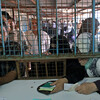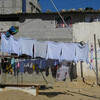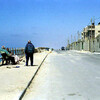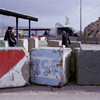
The economy of the occupied Palestinian territory is on the verge of collapse, a new UNCTAD report warns. Dwindling donor support has left the Palestinian Authority (PA) in a perilous financial position and UNCTAD projections indicate that per capita income for 2006 will be half pre-2000 levels, unemployment will affect half the Palestinian workforce by the end of the year, and two out of three Palestinian households will fall below the poverty level. The report cautions that even under a more positive scenario of increased aid, greater mobility, and the resumption of Israeli transfers of tax revenues to the PA, the Palestinian economy is unlikely to achieve sustained growth. Read more about Intensified Aid And Urgent Action Needed To Avert Palestinian Economic Collapse

Deteriorating economic performance and declining living conditions under more intensive restrictions in the occupied Palestinian territory since 2000 have left Palestinians frustrated by higher levels of poverty and unemployment and have damaged the already weak government of the Palestinian Authority (PA), a new UNCTAD study reveals. The study notes that under the Israeli occupation “the institutionalization of restrictive measures, in the context of what my be termed a policy of asymmetric containment, has inflicted a heavy toll on the economy” and has locked it in an “adverse path dependence”. A long-term relief strategy for the Palestinian economy is needed, and it is this that may be viewed as non-distorting aid. Read more about Difficult conditions for Palestinian economy can be overcome, study finds

UNCTAD, with funds contributed by the European Commission (EC), is stepping up technical assistance to support the creation of a Palestinian Shippers Council and the extension of computerized customs operations to the Gaza border with Egypt. The two new field projects will have budgets totalling €703,000. The projects add to UNCTAD´s already-extensive efforts to help the Palestinian people revitalize their economy and build the institutional structures of their future state. They address key economic problems and were designed in close consultation with relevant Palestinian Authority (PA) institutions, international development agencies and concerned donors. Read more about UNCTAD supports Palestinian Shippers Council

Years of economic retrenchment on top of almost four decades of occupation have increased poverty, reduced and distorted production, and heightened dependence on Israel. Prescriptions for Palestinian economic recovery must take into account the Israeli occupation, protracted conflict since 2000, and the imperatives created by the unilateral Israeli withdrawal from Gaza, an United Nations Conference on Trade and Development (UNCTAD) report warns. It recommends that the focus should be on forming institutions that will serve the needs of an upcoming Palestinian State rather than aiming solely at reforming a transitional government, and that efforts to economic revival should target poverty reduction while expanding production and trade. Read more about UNCTAD: "Palestinian preparations for statehood should focus on pro-poor economic reform"

Action on Palestinian development policy may be postponed by the weight of events on the ground. At the same time, however, even if greater stability is achieved, it does not necessarily mean that structural imbalances and distortions will simply recede, warns UNCTAD in its annual report on assistance to the Palestinian people. The report, which will be reviewed at the forthcoming meeting of UNCTAD’s governing body, the Trade and Development Board, Geneva, 4-15 October, notes that the 4.5% estimated growth in real GDP that occurred in 2003 is not sufficient to signal genuine recovery. Its sustainability is uncertain, subject to the implementation of the two-state solution. Read more about UNCTAD report on Palestinian economy calls for intensified donor commitment to development

Unless immediate action is taken to improve the supply capacity of small and medium enterprises (SMEs), the Palestinian economy will be effectively transformed into one of subsistence, warns a new UNCTAD study. The study notes that the protracted conflict in the occupied Palestinian territory has generated profound structural distortions and changes in the functioning of these enterprises that are unlikely to be reversed once political stability is achieved. It examines the SMEs’ contribution to economic growth by shedding light on their life cycle and the factors influencing their establishment, survival, growth and decline before and after the ongoing crisis. Read more about UNCTAD stresses vital role of small-, medium-sized enterprises in rehabilitation of Palestinian economy

Even with the long seacoast of the Gaza Strip, the occupied Palestinian territory is effectively landlocked and almost completely dependent on Israeli transport facilities for participation in international trade. In addition, Israeli closure policy, security measures and control of the main borders and transport routes render Palestinian trade totally dependent on political and security developments. In a new study, UNCTAD shows that this situation will have to be overcome if the extremely high transport costs of Palestinian trade are to be brought down. Read more about Rerouting Palestinian transit trade could cut costs, boost savings, says new UNCTAD study

Protracted occupation and conflict have effectively transformed the occupied Palestinian territory into a “war-torn economy”, with serious implications for Palestinian development prospects, says the United Nations Conference on Trade and Development (UNCTAD) in a new report. The report, issued annually on UNCTAD’s assistance to the Palestinian people, calls for a new policy framework to bridge relief and development efforts. Read more about War-torn Palestinian economy needs to bridge relief and development, says UNCTAD report

By 2003, three years of continuous economic decline and widespread devastation had transformed the occupied Palestinian territory into a “war-torn economy”. The economic legacies of war identified in comparative research on conflict economies are relevant in recognizing the true nature of the Palestinian economic predicament: structural deterioration and sustained negative growth; declining export capacity and emergence of an unsustainable trade gap; and greater external dependence and extended poverty. Read more about UNCTAD's assistance to the Palestinian people

The recently intensified crisis in the occupied Palestinian territory has exhausted the benefits of development efforts, setting the Palestinian economy ‘on the path of de-development’, warns UNCTAD in its annual report on UNCTAD’s assistance to the Palestinian people. Read more about Relief must be linked to development, stresses UNCTAD report









